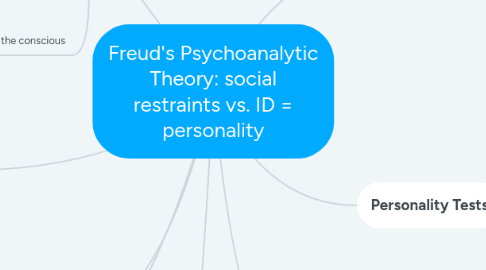
1. Fixations
1.1. negative traits of your personality
1.2. lingering focus of sexual stages that happened in childhood
2. ID
2.1. sex & aggression
2.2. true, raw animalistic desires
2.3. wants satisfication ASAP
2.4. shows itself through dreams & slip of the tongue
2.5. lies in the unconscious
3. Ego
3.1. mediates with the ID and Superego
3.2. protects us from thoughts
3.2.1. Defense Mechanisms
3.2.1.1. regression
3.2.1.1.1. going into an infantile state
3.2.1.2. reaction formation
3.2.1.2.1. ego switches unacceptable impulses into their opposites
3.2.1.3. repression
3.2.1.3.1. push/banish anxiety/bad thoughts into the unconscious
3.2.1.4. projection
3.2.1.4.1. projecting your own threatening impulses onto others
3.2.1.5. rationalization
3.2.1.5.1. self adjusting explanations
3.2.1.6. displacement
3.2.1.6.1. taking it out on others
3.2.1.7. sublimitation
3.2.1.7.1. putting things into socially acceptable ways
3.3. lies in the conscious
4. Superego
4.1. morals
4.2. developed at 5 years old
4.3. lies in the subconscious
5. pyschosexual stages
5.1. oral stage
5.1.1. 0-18 months
5.1.2. sucking
5.2. Anal Stage
5.2.1. 18-36 months
5.2.2. bowel & bladder control
5.3. Phallic Stage
5.3.1. 3-6 years old
5.3.2. incestous
5.3.2.1. oedipus
5.3.2.2. electrica
5.4. Latent stage
5.4.1. dormat
5.5. Genital stage
5.5.1. puberty - death
5.5.2. intimacy
6. Personality Tests
6.1. Projective tests
6.1.1. TAT: thematic apperception tests: write a story based on a picture
6.1.2. Rorschach Inkblot Test; most widely used projective test, what do you see in random inkblots?
7. Neo Freudians
7.1. Doubted sex & agression, all had an emphasis on the conscious mind
7.1.1. Alfred Adler
7.1.1.1. childhood is important to a person
7.1.1.2. no psychosexual stages
7.1.1.3. social factors
7.1.1.4. conquer inferiority and feel superior
7.1.2. Karen Horney
7.1.2.1. childhood anxiety -> dependent child's feelings of helplessness
7.1.2.2. emphasizes love and security
7.1.3. Carl Jung
7.1.3.1. less social factors
7.1.3.2. unconscious
7.1.3.3. collective unconscious
7.1.3.3.1. shared memory line from our species's history
7.1.3.3.2. explains why some humans are afraid of the dark
8. criticisms
8.1. theory is implausible/invalidated/contradicted by new research
8.2. offers only after-the-fact explanations
8.2.1. only looks into the past
